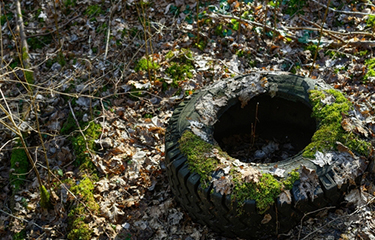The U.S. Environmental Protection Agency (EPA) will investigate 6PPD-quinone, a chemical found in most tires that is toxic to salmon, under the Toxic Substances Control Act.
The action is in response to a petition brought by environmental group Earthjustice on behalf of the Yurok, Port Gamble S’Klallam, and Puyallup Tribes to ban the use of 6PPD in and for tires. While the EPA didn’t outright ban the chemicals, it has granted the tribes’ petition and will issue an advance notice of proposed rulemaking for 6PPD and “initiate additional data gathering activities.”
“This is a victory for salmon and all species and people,” the Puyallup Tribal Council said in a statement. “6PPD is a major and uniquely lethal threat to the health of salmon in urban streams on our reservation. Banning this chemical from tires will be hugely important in protecting fish. We thank the EPA for taking our concerns seriously. We will always act to protect the fish, the water, and our lands.”
6PDD is a chemical used to prevent tires from breaking down too quickly and is nearly ubiquitous in U.S. tore manufacturing. When exposed to ground-level ozone, however, it transforms into 6PPD-quinone, a chemical that can kill coho salmon and contribute to urban runoff mortality syndrome, according to Earthjustice.
The evidence in the petition “supports a finding that 6PPD-quinone is acutely toxic to coho salmon at very low concentrations and additionally harms other fish species, with coho salmon being the most sensitive species studied to date,” the EPA said in its response to the petition. “Specifically, available information on 6PPD-quinone cited by petitioners indicates that concentrations in stormwater were found to be lethal for coho salmon following exposures that lasted only a few hours.”
The EPA has already begun looking into 6PPD-quinone. The agency launched a cross-agency workgroup to look into the chemical in 2022 and is involved in an Interstate Technology and Regulatory Council 6PPD-quinone workgroup.
“Tribal communities have relied on access to healthy salmon populations since time immemorial, and EPA’s grant of the petition is the first important step to addressing this existential threat to the species,” Earthjustice Biodiversity Defense Program Senior Attorney Elizabeth Forsyth said. “We are thrilled that the EPA has recognized that 6PPD poses an unreasonable risk to the environment and that the agency must now regulate it.”
In testimony to the U.S. Senate Appropriations Committee last month, Naisqually Indian Tribe Chairman William Frank III asked legislators to provide funding to address the threat posed by 6PPD-quinone to the salmon population the tribe depends on.
“The Nisqually Tribe has grave concerns regarding the deadly threat that 6PPD Quinone is having on our salmon and treaty-protected resources,” Frank said in a written statement. “The Tribe needs the EPA to provide the critical leadership and sense of urgency needed to immediately solve this problem. This is a crucial issue for the Tribe and all Tribes that depend upon salmon. We have seen our salmon populations decline dramatically over the past 30 years and the negative impacts that have had on our treaty rights, our culture and traditions, and the health of our communities.”
At the same time it announced its petition to the EPA, Earthjustice declared that it would be suing major tire manufacturers in the U.S. over their use of 6PPD on behalf of the Institute for Fisheries Resources (IFR) and the Pacific Coast Federation of Fishermen’s Associations (PCFFA). Bridegestone, Continental Tire, Giti Tire, Goodyear, Cooper Tire and Rubber Company, Hankook Tire, Nokian Tyres, Kumho Tire, Michelin, Pirelli Tire, Sumitomo Rubber, Tokyo Tire, and Yokohama Tire were all sent a 60-day notice in August.
There has also been state-level action on 6PDD. The California Safer Consumer Products program requires tire manufacturers to evaluate 6PDD alternatives, and the Washington Department of Ecology has launched a 6PPD Action Plan, a hazards assessment, and an alternatives assessment, according to the EPA.
Photo courtesy of Shutterstock/RenatasKripasphotography







